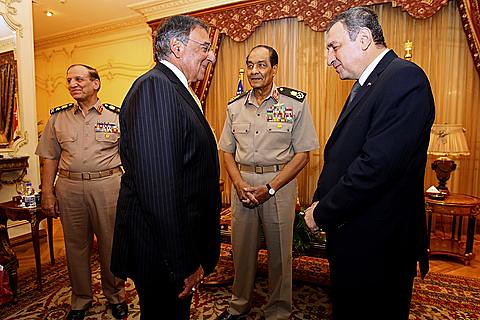
US Secretary of Defense Leon Panetta meets with Egyptian Prime Minister Essam Sharaf and Field Marshal Tantawi. The White House is concerned about developments in the North African state., a photo by Pan-African News Wire File Photos on Flickr.
Egypt opens trial of 43 pro-democracy workers
None of 16 Americans involved appear in court as US warns case could trigger cut in aid
Abdel-Rahman Hussein in Cairo and Julian Borger
guardian.co.uk, Sunday 26 February 2012 12.19 EST
Egyptian defendants who worked for western-backed pro-democracy groups stand in a cage at the opening of their trial. Photograph: Khaled Desouki/AFP/Getty Images
The controversial Egyptian trial of 43 employees of western-backed pro-democracy groups got off to a tumultuous start in Cairo on Sunday in the face of US warnings that it could trigger cuts in American aid and jeopardise Egypt's relations with Washington.
The 14 defendants who appeared in court to plead not guilty were mostly Egyptian. The 16 Americans involved in the case were not asked to appear, while intense negotiations were under way between Egyptian officials and US diplomats over their fate.
The prosecution of NGO workers trying to nurture Egypt's young pro-democracy movement has strengthened doubts about the readiness of the country's generals to hand over power to an elected civilian government. The defendants were charged with "illegal activities", including political training and polling, which the prosecution argued amounted to "an infringement on the sovereignty of the state of Egypt".
The first day in court illustrated the high stakes involved in the case at a time when the outcome of the Egyptian revolution, which deposed Hosni Mubarak, is still being fought over.
Lawyers, family members and journalists jostled to get into the courtroom where the defendants and their supporters chanted slogans calling for the military government to step down. At one point, the presiding judge, Mahmoud Mohammed Shoukry, was forced to declare a recess because of the crush of photographers scrambling to take pictures of the defendants in their cages.
Shoukry adjourned the court till 26 April and released the defendants until then.
"It's a mixed feeling," said Nancy Okail, the director of Freedom House in Egypt, one of the organisations that was raided in December. She attended the hearing although she had not been officially summoned. "There's a great sense of injustice, but also strength … There is a lack of clarity in the nature of our activities, every image that has been formed about us is by the state media and that is creating suspicion."
The US Congress and the Obama administration have threatened to cut the annual $1.5bn aid package to Egypt, which dates back to the 1979 Camp David peace agreement with Israel, if the case is not dropped.
Egyptian officials say they are powerless to interfere with the judiciary, but activists say the generals are using a Mubarak-era law restricting civil society groups to silence critics. That law requires foreign NGOs to be registered with the ministry of social solidarity, which must approve all funding. The case is being led by a Mubarak-era minister, Fayza Abul-Naga.
Of the 16 Americans involved in the case, seven have been banned from leaving the country, including Sam LaHood, the son of the US transport secretary.
The Americans were not summoned but their defence teams were present and pleaded not guilty on their behalf. In court, the prosecution alleged that the five NGOs in the dock – four American and one German – received more than $20m in 2011.
Tawhid Ramzy, a member of the defence team for one of the groups, the International Republican Institute, said: "They are terrified, especially with the impartial and overblown media coverage surrounding the case. The Egyptian defendants are terrified, so imagine how the foreign defendants might be feeling."
No comments:
Post a Comment